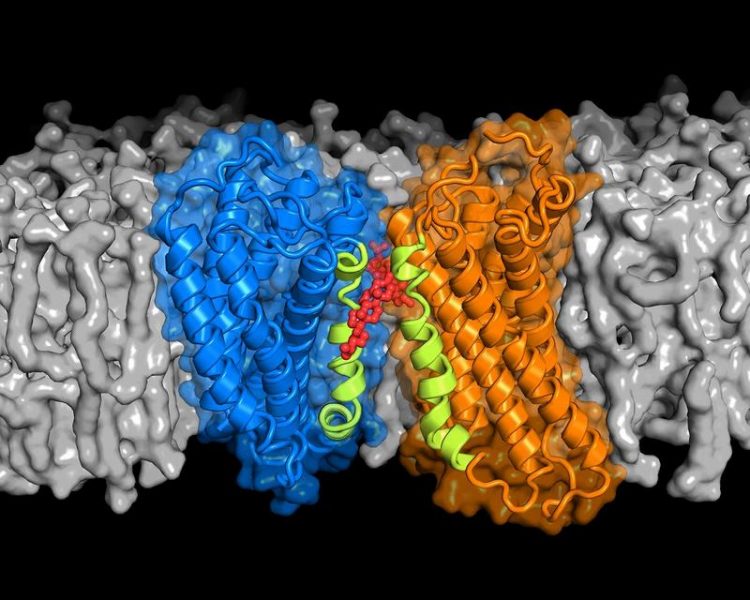Cholesterol important for signal transmission in cells

CXCR4 receptor which belongs to a group known as G protein-coupled receptors FAU/Rainer Böckmann
FAU researchers Kristyna Pluhackova and Stefan Gahbauer discovered that cholesterol strongly influences signal transmission in the body. Their study focused on the chemokine receptor CXCR4, which belong to a group known as G protein-coupled receptors (GPCRs).
These receptors sense external stimuli such as light, hormones or sugar and pass these signals on to the interior of the cell which reacts to them. CXCR4 normally supports the human immune system. However, it also plays an important role in the formation of metastases and the penetration of HIV into the cell interior.
There is evidence to suggest that certain GPCRs must form pairs known as dimers in order to sense and pass on external stimuli. The FAU researchers’ simulations show that cholesterol strongly influences the formation of CXCR4 pairs, which in turn suggests that it affects their function. This means that cholesterol is required for these pairs to form correctly.
In this process, cholesterol molecules selectively ‘glue’ specific regions of two CXCR4 molecules together , resulting in a complex structure that is believed to sense signals and pass them on through the cell membrane. Although the receptors can still bind to one another without sufficient cholesterol, in this case different structures are formed which most likely suppress the transmission of signals to the cell interior.
These processes had not been studied in depth on the molecular level until now. The two researchers from the Computational Biology group at FAU’s Chair of Biotechnology used over 1000 computer simulations to examine them. A better understanding of the influence of cholesterol and dimerisation on the function of GPCRs could pave the way for new medications to be developed.
*Doi: http://dx.plos.org/10.1371/journal.pcbi.1005169
Further information:
Prof. Dr. Rainer Böckmann
Phone: +49 9131 8525409
rainer.boeckmann@fau.de
https://www.fau.eu/2016/11/09/news/research/cholesterol-important-for-signal-tra…
Media Contact
All latest news from the category: Life Sciences and Chemistry
Articles and reports from the Life Sciences and chemistry area deal with applied and basic research into modern biology, chemistry and human medicine.
Valuable information can be found on a range of life sciences fields including bacteriology, biochemistry, bionics, bioinformatics, biophysics, biotechnology, genetics, geobotany, human biology, marine biology, microbiology, molecular biology, cellular biology, zoology, bioinorganic chemistry, microchemistry and environmental chemistry.
Newest articles

Properties of new materials for microchips
… can now be measured well. Reseachers of Delft University of Technology demonstrated measuring performance properties of ultrathin silicon membranes. Making ever smaller and more powerful chips requires new ultrathin…

Floating solar’s potential
… to support sustainable development by addressing climate, water, and energy goals holistically. A new study published this week in Nature Energy raises the potential for floating solar photovoltaics (FPV)…

Skyrmions move at record speeds
… a step towards the computing of the future. An international research team led by scientists from the CNRS1 has discovered that the magnetic nanobubbles2 known as skyrmions can be…





















